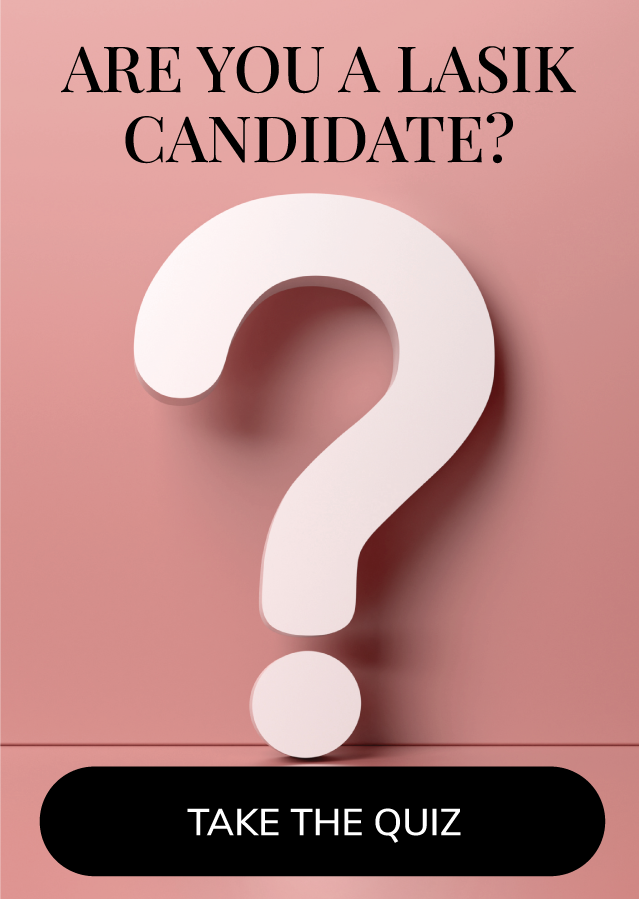LASIK is a very popular procedure among our 40- and 50-something patients. They’re jumping into a new phase of life with both feet—and they don’t want to worry about whether their glasses are going to fall off or they’ll lose a contact lens! There are some special considerations to be aware of if you are in this age group. Here’s our realistic assessment of the pros and cons of LASIK after age 40.
The lens of the eye is a lot like the zoom lens on a camera. In order to see up close, the human lens changes shape to focus at near. As we get older—usually any time after age 40—we can’t zoom as effectively, making objects blurry. This requires glasses to see clearly at near. This normal, age-related condition is called presbyopia.
One way to handle presbyopia without glasses is an approach called monovision. One eye is corrected to focus on distance, and the other is corrected to focus on near objects. Thanks to the ability of our brains to suppress unhelpful information, we ignore distance information from the eye that’s focusing on close objects and close-up information from the eye that's been corrected to see well into the distance.
You can achieve temporary monovision using contact lenses and permanent monovision through LASIK.
Pros:
You can ditch the glasses and contacts. As with any LASIK surgery, this is the number one reason people have monovision Lasik performed. You’ll be able to see objects at a distance and nearby without using glasses or contacts for most of your activities. It’s about freedom, flexibility and independence.
It’s an option that works in a number of scenarios. Whether you’re a 54-year-old lawyer with moderate nearsightedness and mild astigmatism who spends most of the day on a computer, a 47-year-old bank teller with great distance vision who wants to be able to do day-to-day tasks without reading glasses, a 45-year-old baker with mild nearsightedness who can’t wear contacts and is sick of fogged-up glasses, or a 56-year-old accountant with moderate nearsightedness who doesn’t want to lose her excellent near vision, monovision LASIK could be a good solution for you.
It’s reversible. If you don’t like monovision, you can wear glasses or contact lenses to correct the effect or have the under-corrected eye enhanced with an additional LASIK procedure so that you have excellent distance vision.
Cons:
It’s a compromise. You won’t have perfect distance vision, and you won’t have perfect close-up vision. Your depth perception may be decreased. All of these effects are most noticeable in low light and when doing activities that require sharp vision. You might have problems reading in a really dimly lit restaurant, or on a golf course.
You may not adjust. It’s not common, but some people have trouble adapting to having one eye corrected for distance vision and the other corrected for close-up vision. If that’s the case, you’ll need to correct the monovision using glasses or contacts.
You may still eventually require reading glasses. Monovision Lasik can’t prevent the natural deterioration in our close-up vision that happens with age.
The most important thing to consider when deciding whether to proceed with monovision LASIK is your expectation of the outcome. Is the convenience of not having to wear some combination of glasses and contact lenses more important to you than crystal-clear vision? Are you willing to wear glasses or contact lenses to correct the nearsightedness in your one eye if certain activities, such as driving at night, require optimized distance vision? Are you an avid (or professional) reader? You may need to wear reading glasses for long stints of reading.
You can try monovision on for size using contact lenses to mimic the outcome of surgery. It’s a great way to see whether monovision is something you’ll adjust to well.
Your expectation of the outcome is also why your choice of LASIK surgeon is especially important if you’re over age 40. Make sure your consultation is with the surgeon performing your procedure and choose a surgeon who is willing to explain your options carefully, listen to your goals, and give a realistic assessment of your probable outcomes.
SAVE $800 ON LASIK FOR A LIMITED TIME
Book a free, no-pressure consultation today to save $800 on your procedure. We'll also discuss financing options to help you find the best way to get clear vision sooner!
![Corvue-Horizontal-Logo-gradient[rgb]-black-text Corvue-Horizontal-Logo-gradient[rgb]-black-text](https://corvue.ca/app/uploads/2017/10/Corvue-Horizontal-Logo-gradientrgb-black-text.png)

